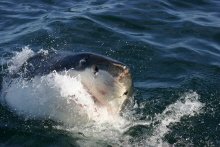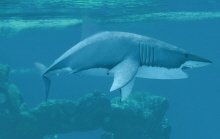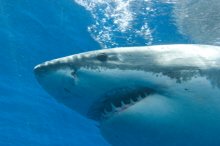The Great White Shark
I have included Great White Sharks in this section because they do inhabit the waters around Australia (as well as other places) and because I think they are awesome creatures.
The Great White is also known as the White Pointer, White Shark or White Death.
They have a body shaped like a torpedo and a pointed snout. They have a white underside and a grey dorsal area. They have rows of teeth, their teeth number about 2,800.

The female is generally bigger than the male with the average adult measuring about 4 to 4.8 metres with a typical weight of 680 to 1,100 kilograms, although they can get much bigger with lengths of more than 6 metres and weight up to 2,250 kilograms being reached.
What do Great White Sharks eat? Whatever they want to! But seriously. They usually eat fish, dolphins, porpoises, seals, sea lions and dead animals they find floating in the water.

Most sharks are predators and the Great White is an apex marine predator, meaning it is at the top of the food chain in its environment with no real threats.
Their eggs develop in the uterus, hatching there and continuing to develop until they are born. The gestation period is 11 months, within the first month the jaws begin to grow. There is no placenta to get nourishment from so they feed on the unfertilised eggs and smaller siblings in the womb, this is known as intrauterine-cannibalism.

They have a reputation for being a man-eater, and although they are one of the dangerous Australian animals and there have been fatalities due to attacks by them, this reputation is probably due more to the movie "Jaws" than anything else, and I don't know about you but I certainly stayed out of the ocean for quite awhile after seeing that movie.
Great White Sharks live in waters which have a temperature of between 12 degrees and 24 degrees Celsius. In Australia they have been recorded from southern Queensland to northwestern Western Australia.
Go to next animal page: Australian Snakes
Return to Australian Animals or go to Australian Animal Emblems
Return from Great White Shark to Australian-Information-Stories home page


